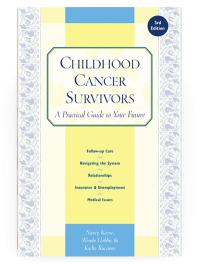Childhood Cancer Survivors
Post-traumatic stress
During treatment, patients are engaged in an arduous battle against their cancer. They direct all of their time, energy, and strength toward dealing with immediate survival. But when the treatments stop, the drugs aren’t necessary, and the scars heal, many survivors come to realize there is also an emotional price to pay and that being free of cancer does not mean their emotions are cancer-free.
Some feelings may be set aside while you cope with treatment, but when treatment ends, you are left to come to grips with the experience and what it means in your life. That process can be very difficult. Family, friends, and doctors may brush off your concerns, saying it’s time to “get on with your life.” You may think that ignoring the feelings will cause them to disappear. Unresolved emotions usually don’t just vanish—they may even grow stronger and surface unexpectedly.
I had Hodgkin’s when I was 15. I tried so hard as a freshman in college to put it behind me and get on with my life. It just didn’t work. Next to treatment, that was the worst year of my life. It showed me that if I didn’t deal with it consciously, I was going to deal with it subconsciously. I had nightmares every night. I’d wake up feeling like I had needles in my arms. Once I started dealing with it, things improved. I had a wonderful English composition teacher that year. I really spilled out my soul to him in writing that year, and he held it gently. I’ve just written him a thank-you note telling him that upon rereading my journal, I came to realize how much I put into his hands that year.
After people experience a traumatic event, they may have feelings of anxiety that persist over time. Just like soldiers returning from combat, survivors of childhood cancer and family members may experience symptoms of post-traumatic stress. Some of the most common symptoms are:
-
Avoiding people, places, and thoughts that remind you of treatment.
-
Being hypervigilant (feeling constantly “on alert”).
-
Difficulty falling or staying asleep.
Other symptoms include irritability or angry outbursts, difficulty concentrating, or having an exaggerated startle response. Some people tend to have intrusive recollections or dreams of the event, or feelings that the trauma is recurring (flashbacks). Survivors and their family members may have only some of these symptoms of post-traumatic stress, or they may have enough symptoms to meet the criteria for a diagnosis of post-traumatic stress disorder (PTSD).
I had cancer when I was 19, and it recurred at 21. I have frequent nightmares. I sit up in my sleep screaming. My fiancé tells me about them in the morning—I usually don’t remember. I also wake up if any sound reminds me of the hospital. For instance, that crinkly sound the hospital beds make when you move reminds me of getting transfusions. If I hear any crinkly sounds in the night, I wake up really scared. This Halloween I went into a haunted house and had an anxiety attack. The flashing lights disoriented me, and I felt like I was in the hospital on Ativan ® . I started breathing fast and my heart raced. I had to leave and go home.
• • • • •
About 2 a.m., I woke up and my husband was sitting on the edge of the bed crying. I asked him if everything was okay and he said yes, so I drifted off again. A little while later he woke me up and asked me to stay awake with him. He was sweating, breathing fast, and his heart was racing. He said he had had a flashback about our son’s cancer and was afraid he was losing his mind. I just held him and told him that our son was okay. In about half an hour he was calm again and we both went to sleep. The last few weeks it’s been pretty obvious that he was suffering from other than ordinary stress, and we’ve been discussing him getting some help. My gut tells me this is urgent.
• • • • •
A year or so after treatment, I was watching one of those St. Jude specials (I avoid them now). When one of the children’s IV (intravenous) pumps beeped, all the blood left my head, I got terribly dizzy, and I almost passed out. What a visceral reaction! And I thought I had adjusted well.
Rates of PTSD among survivors and their parents are generally low, but many survivors and their parents have some symptoms of post-traumatic stress. 1 , 2 The good news is that treatments are available to help people recover from PTSD or manage post-traumatic stress symptoms.
Table of Contents
All Guides- 1. Survivorship
- 2. Emotions
- 3. Relationships
- 4. Navigating the System
- 5. Staying Healthy
- 6. Diseases
- 7. Fatigue
- 8. Brain and Nerves
- 9. Hormone-Producing Glands
- 10. Eyes and Ears
- 11. Head and Neck
- 12. Heart and Blood Vessels
- 13. Lungs
- 14. Kidneys, Bladder, and Genitals
- 15. Liver, Stomach, and Intestines
- 16. Immune System
- 17. Muscles and Bones
- 18. Skin, Breasts, and Hair
- 19. Second Cancers
- 20. Homage
- Appendix A. Survivor Sketches
- Appendix B. Resources
- Appendix C. References
- Appendix D. About the Authors
- Appendix E. Childhood Cancer Guides (TM)

